Digital Poster
Advances in Imaging for Multiple Sclerosis
ISMRM & ISMRT Annual Meeting & Exhibition • 10-15 May 2025 • Honolulu, Hawai'i

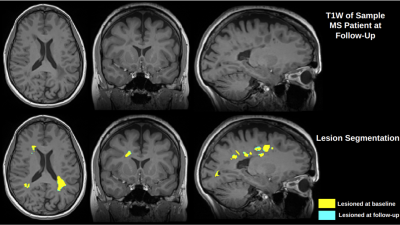 |
Computer Number: 81
3737. Diffusion
MRI of white matter lesion dynamics in progressive multiple
sclerosis
J. Chad, J. Rybkina, T. Bruno, B. Colella, R. Green, A.
Gilboa
Baycrest Academy for Research and Education, Toronto, Canada
Impact:
This work indicates that it may be desirable to monitor the progressive stage of MS by assessing diffusion changes within white matter lesions, rather than merely within the NAWM as is customary. |
|
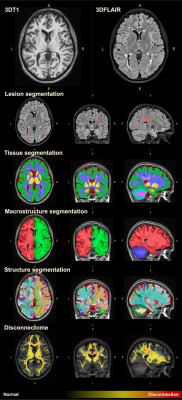 |
Computer Number: 82
3738. Identifying
MRI Biomarkers of Disease Progression in Multiple Sclerosis:
Disconnection and Atrophy Patterns Predictive of SPMS Conversion
S. Hannoun, S. Ghazal, L. Halawi, C. Al-Dahouk, N.
El-Ayoubi, S. Khoury
American University of Beirut, Beirut, Lebanon
Impact: Our findings provide actionable MRI biomarkers
that could transform MS patient management by identifying
those at higher risk for progression, enabling timely
therapeutic interventions. This approach could lead to
improved outcomes and open avenues for individualized MS
care.
|
|
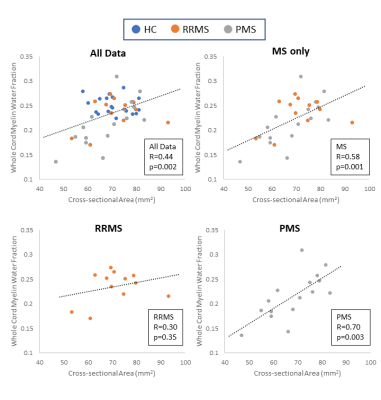 |
Computer Number: 83
3739. Cervical
spinal cord cross-sectional area correlates with myelin water
fraction in progressive multiple sclerosis
I. Vavasour, S. Balaji, C. Laule, R. Tam, D. Li, A.
Traboulsee, S. Kolind
University of British Columbia, Vancouver, Canada
Impact: By examining both cross-sectional area and
myelin water fraction in multiple sclerosis spinal cord, we
may be able to differentiate volume loss due to potentially
reversible demyelination from irreversible axonal loss.
|
|
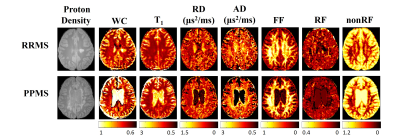 |
Computer Number: 84
3740. Water
Content, T1 relaxation and Diffusion MRI Correlates of
Antiphospholipid Antibodies in Primary Progressive Multiple
Sclerosis
N. Marini, K. Frese, P. Patel, P. Becquart, A. Traboulsee,
R. Carruthers, S. Kolind, A. Shabas, A-L Sayao, V.
Devonshire, R. Tam, W. Moore, D. Li, J. Quandt, I. Vavasour,
C. Laule
University of British Columbia, Vancouver, Canada
Impact: Biological immune factors that impact MRI
metrics may change depending on the subtype of MS being
imaged. It is possible that the specificity of advanced MRI
varies across MS phenotypes and further investigation is
warranted.
|
|
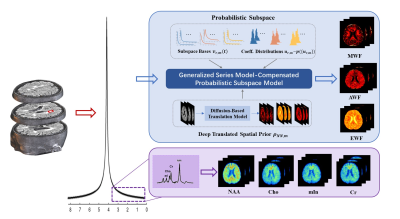 |
Computer Number: 85
3741. Simultaneous
High-Resolution 3D Metabolic Imaging and Myelin/Axonal Water
Fraction Mapping in Multiple Sclerosis Using SPICE
Y. Guan, R. Liu, Y. Li, B. Bo, W. Tang, S. Feng, T. Sheng,
Y. Zhao, W. Jin, X. Chen, Z-P Liang, Y. Li
National Engineering Research Center of Advanced Magnetic Resonance Technologies for Diagnosis and Therapy, School of Biomedical Engineering, Shanghai Jiao Tong University, Shanghai, China
Impact: Simultaneous high-resolution whole-brain
metabolic imaging and myelin/axonal water fraction mapping
may provide useful biomarkers to characterize MS
pathophysiology.
|
|
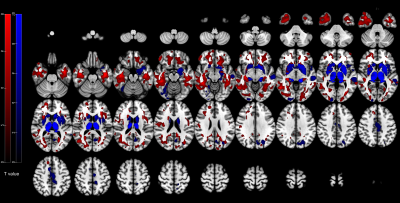 |
Computer Number: 86
3742. Gray
matter metabolic changes and atrophy in multiple sclerosis
correspond to neurotransmitter maps
Y. Xie, S. Wu, H. Zhu, X. Zhang, W. Zhu
Tongji Hospital, Tongji Medical College, Huazhong University of Science and Technology, Wuhan, China
Impact: We illustrated the important role of altered
sodium concentration in the pathophysiological mechanisms of
MS and provided new insights into the relationship between
GM metabolic alteration and irreversible neuronal loss and
neurotransmission function.
|
|
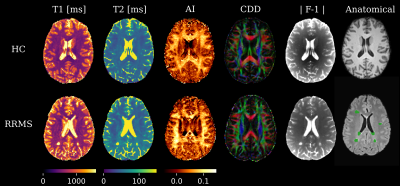 |
Computer Number: 87
3743. Phase-Cycled
Balanced Steady-State Free Precession Multi-Parametric Mapping
in Relapsing-Remitting Multiple Sclerosis
F. Birk, H. Tesh, B. Bender, S. Buschbach, U. Groeper, P.
Iyyappan Valsala, A. Deshmane, T. Lindig, K. Scheffler, R.
Heule
University Hospital Tübingen, Tübingen, Germany
Impact: This study marks the first application of
MP-qMRI with pc-bSSFP imaging for assessing tissue changes
in RRMS patients.
|
|
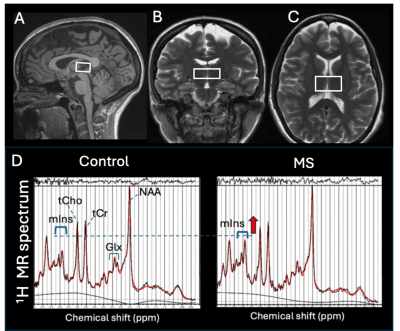 |
Computer Number: 88
3744. The
association between the 1H-MR spectroscopy biomarker of
astrogliosis and the PET biomarker of microglia in the thalamus
in multiple sclerosis
F. Kara, N. Neyal, M. Kamykowski, C. Schwarz, J.
Kendall-Thomas, H. Morrison, M. Senjem, S. Przybelski, A.
Fought, J. Port, D. Deelchand, V. Lowe, G. Oz, K. Kantarci,
O. Kantarci, B. Zeydan
Mayo Clinic, Rochester, United States
Impact: This study demonstrates the utility of combining
MRS, PET, and MRI to explore innate immune activation and
neurodegeneration in multiple sclerosis, potentially guiding
targeted interventions by offering a comprehensive view of
thalamic involvement in disease development and progression.
|
|
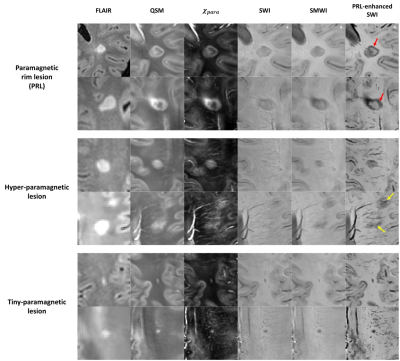 |
Computer Number: 89
3745. PRL-enhanced
SWI: Paramagnetic Rim Lesion-enhanced Susceptibility Weighted
Imaging for Multiple Sclerosis
T. Kim, E. S. Jeong, Y. Choi, J. Lee
Seoul National University, Seoul, Korea, Republic of
Impact: PRL-enhanced SWI shows a potential as a valuable
clinical tool for distinguishing MS lesions from non
MS-specific lesions and may improve diagnostic accuracy.
|
|
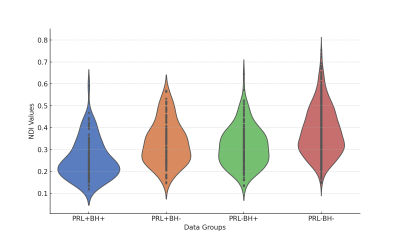 |
Computer Number: 90
3746. Characterizing
Paramagnetic Rim Lesions in Relapsing-Remitting Multiple
Sclerosis: A Study on Myelin Content and Axonal Density
Z. Shi, Q. Zhu, Z. Yan, L. Nie, Y. Li
The First Affiliated Hospital of Chongqing Medical University, Chongqing, China
Impact: PRL+BH+ is a more destructive subset of PRL
associated with disability in RRMS. Preventing PRL+BH- from
converting to PRL+BH+ may help slow disability progression.
This imaging feature also provides a novel outcome variable
for clinical cohort studies.
|
|
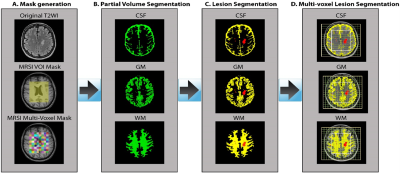 |
Computer Number: 91
3747. A
neuro-metabolic MRI evaluation of the impact that dietary
improvement has on MS: A pilot study
O. Al-iedani, O. Wills, V. Maltby, R. Lea, S. Ramadan, Y.
Probst, J. Lechner-Scott
University of Newcastle, Callaghan, Australia
Impact: This pilot study demonstrates the potential of
dietary interventions for influencing the neuro-metabolic
composition of plwMS, warranting a larger-scale trial. This
research could lead to novel, non-pharmacological approaches
for managing MS, potentially improving patient outcomes and
quality of life.
|
|
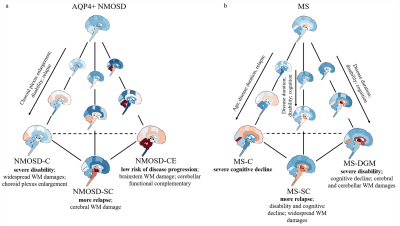 |
Computer Number: 92
3748. Spatiotemporal
Subtypes of Brain and Spinal Cord Atrophy in Neuromyelitis
Optica Spectrum Disorders and Multiple Sclerosis
Z. Zhuo, T. Hua, Y. Zhang, Y. Liu
Beijing Tiantan Hospital, Capital Medical University, Beijing, China
Impact: These novel imaging subtypes in NMOSD and MS can
help interpret disease heterogeneity, develop stratified
management, and assess prognosis.
|
|
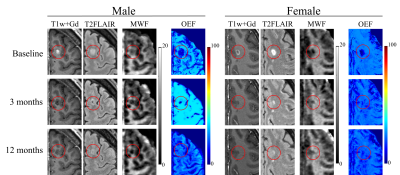 |
Computer Number: 93
3749. REMYELINATION
AND ITS ASSOCIATION WITH OXYGEN EXTRACTION FRACTION DIFFER
BETWEEN MALE AND FEMALE IN MULTIPLE SCLEROSIS
P. Elanghovan, T. Nguyen, S. Zhang, Y. Wang, S. A. Gauthier,
J. Cho
The State University of New York at Buffalo, Buffalo, United States
Impact: This study demonstrates QQ’s feasibility for
investigating the relationship between remyelination and OEF
and its differences between male and female in MS. QQ-based
OEF mapping can help develop gender-tailored therapeutic
interventions for remyelination.
|
|
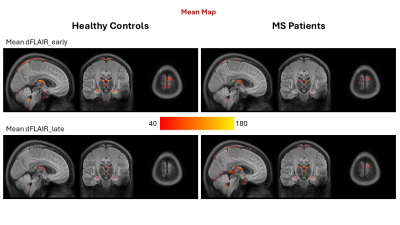 |
Computer Number: 94
3750. Impaired
Glymphatic and Lymphatic Contrast Clearance in Multiple
Sclerosis: Quantitative Analysis of dFLAIR Imaging at 7T MRI
L. Jiang, J. Zhuo, P. R. Raghavan, L. Patel, S. Choi, D.
Harrison
University of Maryland Baltimore, Baltimore, United States
Impact: This study highlights altered glymphatic
function as a potential biomarker for MS disease
progression. Findings underscore the utility of 7T dFLAIR
imaging in assessing glymphatic clearance, opening pathways
for improved diagnostic and therapeutic strategies targeting
waste clearance in MS patients.
|
|
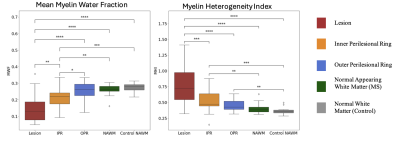 |
Computer Number: 95
3751. Perilesional
myelin damage around multiple sclerosis spinal cord lesions
predicts change in disability over 5 years in progressive MS.
P. Johnson, E. Jamieson, I. Vavasour, C. Laule, D. Li, A.
Traboulsee, S. Kolind
University of British Columbia, VANCOUVER, Canada
Impact: Spinal cord myelin imaging of lesional and
perilesional tissue may be useful as a prognostic biomarker
for monitoring patients with progressive multiple sclerosis
(MS) especially in clinical trials for progressive MS, for
which therapies are lacking.
|
|
 |
Computer Number: 96
3752. Probing
white matter microstructure in multiple sclerosis patients using
standard model diffusion MRI
C. Jin, A. Toubasi, C. Gheen, T. Vinersky, X. Jiang, F.
Bagnato, J. Xu
Vanderbilt University Institute of Imaging Science, Nashville, United States
Impact: SMI-derived metrics are sensitive to
pathological changes in MS lesions and show promise for
clinical applications in MS.
|
The International Society for Magnetic Resonance in Medicine is accredited by the Accreditation Council for Continuing Medical Education to provide continuing medical education for physicians.